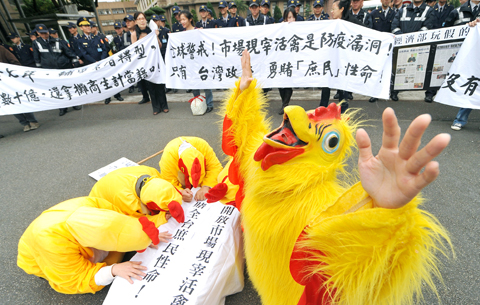Government leniency on the butchering of live animals in traditional markets is inhumane and could facilitate the transmission of bacteria, animal rights activists said yesterday during a protest in front of the Executive Yuan, an allegation the Council of Agricultural (COA) later rebutted.
Dressed in chicken suits, protesters from Environment and Animal Society of Taiwan (EAST) called on the government to deliver on its promise to outlaw the killing of live animals in traditional markets starting next month.
Since August 2006, the council has promised NT$500 million (US$15.7 million) to subsidize more than 760 traditional meat stands across the country to purchase refrigerated display cases to phase out live slaughter, EAST director Chen Yu-min (陳玉敏) said.

PHOTO: LIU HSIN-DE, TAIPEI TIMES
However, government inaction has disappointed many vendors who ended up using their freezers as storage space, she said.
Blood and innards left in the open following the live slaughter of poultry, Chen said, has turned traditional markets into hotbeds for bacteria such as salmonella, adding that there have been reports in Vietnam and Indonesia of women and children falling ill after prolonged exposure to the conditions in traditional markets.
The activists said bacteria levels in freshly killed chickens in traditional markets are twice as high as chickens that were electrically immobilized in legally approved slaughtering plants.
EAST urged consumers to abandon their traditional way of thinking that “live killing guarantees freshness” and realize that such methods are extremely inhumane and distressing to the animals.
The council denied it had performed a U-turn on its policy, saying most traditional market poultry vendors had agreed to use refrigeration. It also said it was providing education on how to slaughter the animals in a humane and sanitary manner.

Eight restaurants in Taiwan yesterday secured a one-star rating from the Michelin Guide Taiwan for the first time, while three one-star restaurants from last year’s edition were promoted to two stars. Forty-three restaurants were awarded one star this year, including 34 in Taipei, five in Taichung and four in Kaohsiung. Hosu (好嶼), Chuan Ya (川雅), Sushi Kajin (鮨嘉仁), aMaze (心宴), La Vie by Thomas Buhner, Yuan Yi (元一) and Frassi in Taipei and Front House (方蒔) in Kaohsiung received a one-star rating for the first time. Hosu is known for innovative Taiwanese dishes, while Chuan Ya serves Sichuan cuisine and aMaze specializes

Taitung County is to launch charter flights to Malaysia at the end of this year, after setting up flights to Vietnam and Thailand, the Taitung County Government said yesterday. The new charter flight services, provided by low-cost carrier Batik Air Malaysia, would be part of five-day tour packages for visits to Taitung County or Malaysia. The Batik Air charter flight, with about 200 seats, would take Malaysian tourists to Taitung on Dec. 30 and then at 12:35pm return to Kuala Lumpur with Taiwanese tourists. Another charter flight would bring the Taiwanese home on Jan. 3 next year, arriving at 5:30pm, before taking the

Taiwan High Speed Rail Corp. (THSRC) plans to ease strained capacity during peak hours by introducing new fare rules restricting passengers traveling without reserved seats in 2026, company Chairman Shih Che (史哲) said Wednesday. THSRC needs to tackle its capacity issue because there have been several occasions where passengers holding tickets with reserved seats did not make it onto their train in stations packed with individuals traveling without a reserved seat, Shih told reporters in a joint interview in Taipei. Non-reserved seats allow travelers maximum flexibility, but it has led to issues relating to quality of service and safety concerns, especially during

An exhibition celebrating Taiwan and Japan’s comic culture opened on Saturday in Taichung, featuring a section that explores Taiwanese reproductions of Japanese comics from when martial law limited Japanese representation. “A Century of Manga Culture: An Encounter of Taiwan and Japan’s Youth” held its Taiwan opening ceremony at Taichung’s National Taiwan Museum of Comics after an initial one-month run in Japan’s Kyoto International Manga Museum between May 24 and June 24. Much like the Kyoto exhibition, the show mainly celebrates the comic connection between Taiwan and Japan through late Taiwanese comic book